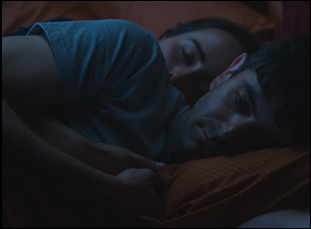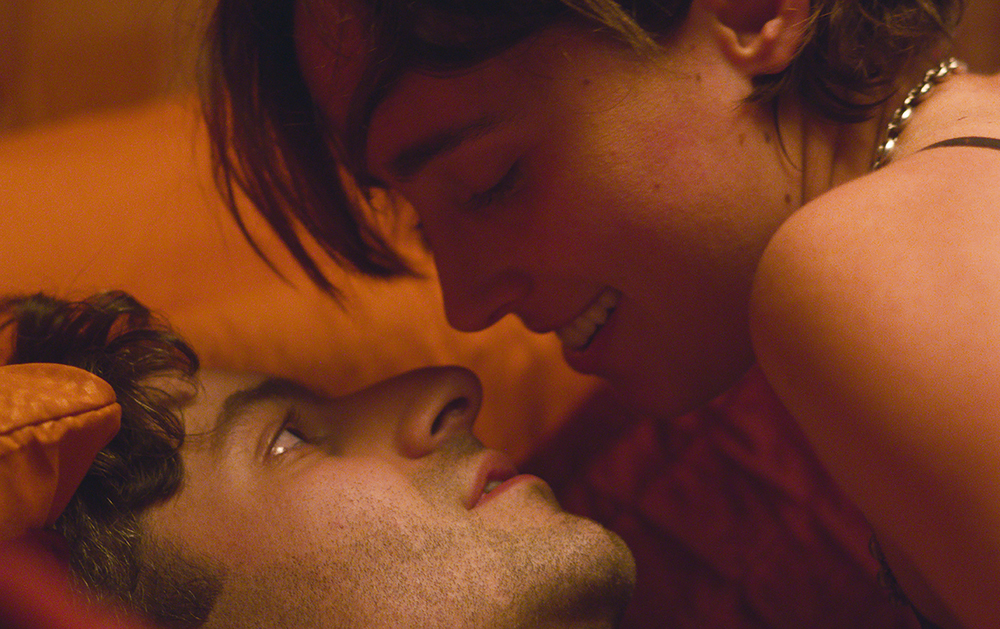It’s a quiet drive to a woodsy retreat outside the city in “Valentine” for a couple that might not know exactly what to say to each other in spite of the intimate romantic getaway they’re about to embark on. It isn’t a secret that Corey (Jacob Tobia) has begun to identify themselves as nonbinary, something that is welcomed by their partner Mia (Sadie Scott) but an adjustment nonetheless when only Corey can know exactly what they’re going through and isn’t entirely sure how to feel, making the position of being a caring companion a difficult spot.
A suggestion that Corey shave has the potential to open up new wounds or a new outlook in Chris McNabb and Beck Kitsis’ tender short film, which sees the partners in both professional and personal life explore the implications for a romantic relationship when someone involved begins to transition and what it means to fully accept someone for who they are. While Corey and Mia attempt to lighten up the situation by teasing each other about whose skin will be smoother, underneath they’re scrambling to get their bearings, still comfortable in each other’s arms, but less so when left alone. Kitsis, who previously directed the spooky “The Three Men You Meet at Night,” edited by McNabb as they always do, reveals the terror that can be found just between two people trying to figure things out, fearing they’re only making things worse by trying to be helpful and although the usual horrific inferences of a cabin in the woods setting may not entirely apply here, it’s only after evoking the unsettling experience so precisely that true catharsis can happen for the couple.
With “Valentine” already gathering steam on the festival circuit before its New York premiere at Tribeca this week (though available to watch at home anywhere in the US as part of the festival’s shorts program), McNabb and Kitsis generously spoke of their latest collaboration and being conscientious of finding the right cast and crew to bring it to life, as well as reinterrogating their real-life inspirations for the story and locating the perfect closing song.

Beck Kitsis: We had been thinking in general that there aren’t many films that tell stories like ours. There’s a great film called “Laurence Anyways” that is similar and more epic and it covers this relationship throughout the years where one person in the couple was identifying as cis in the beginning and then throughout their relationship they come out as trans and how that impacts them. But Xavier Dolan is not trans and there were certain things in that film that felt inauthentic to our experience, so we started thinking what would it look like for us to tell our own story.
Chris McNabb: Growing up, the stories that I’d always seen about being trans were always someone being othered or some kind of villain, like Buffalo Bill in “Silence of the Lambs” or the butt of a joke like in “Ace Ventura.” So it was always very odd for me with confusion about my gender because it made me want to keep that inside. When I came out and [we were] figuring things out as a couple, it was really hard to look out there and see nothing to reflect our own experiences, so we really wanted to create something that felt really authentic and nuanced and [not] some kind of tragedy that we’d seen before.
Beck Kitsis: Yeah, the very fact that we didn’t see any stories or watch any movies like this that had a story that ended well, I really did feel like, “Oh God, I guess the reason we really don’t see stories like this is because it does not end well,” and we’ve been together for seven years and this was in the first two years of our relationship. I wish I had seen a story where things were more positive because it might’ve made me feel a little more optimistic at the time and a little less despondent, not about the situation with Chris, but the ability for us to succeed as a couple.
There’s some really interesting framing of the subjects literally where you see the similarities between bodies. What was it figuring out the camerawork?
Chris McNabb: One thing that we were really interested in was how different people experience have different experiences with their gender and for more specifically in this film, it’s femininity, so the character of Corey that’s played by Jacob Tobia has a very positive experience with exploring femininity and the character of Mia, played by Sadie Scott is a little bit uncomfortable with the more feminine aspects [of their body] and may be a little bit more tomboyish.
Beck Kitsis: Yeah, maybe finding those roles a little bit oppressive. And this isn’t a blanket statement, but we were also interested in how for a lot of women, there’s a little more room to transgress. We have such a thing as a tomboy and some women don’t shave their armpits or wear baggy clothes and it’s not like it attracts that much attention from society [or] anyone is made to feel super othered. But the minute someone like Chris would try to explore their gender identity or transgress, it’s like a huge thing and society is obsessed with dissecting that. There’s not a lot of room for people just trying to explore themselves in a safe environment. So the close-ups and cross-cutting between [the bodies], we weren’t trying to encourage people to compare and contrast, “Oh, this person is wearing this well. This person is not.” It was more about their reaction to the clothes they’re wearing and how they make them feel empowered or suffocated.
How do you create a safe environment on set for a story like this?
Chris McNabb: One of the biggest things we had on set that was really helpful was Meleza S. Morris, an intimacy coordinator who was incredible. They were there for most of the shoot, not just the intimate scenes, for Jacob and Sadie to always feel safe and heard. They’re both nonbinary actors and Sadie was playing a cisgender character and if there were moments where they had some feelings come up about their gender, Meleza was able to step up and talk to them about it and then work with them together to make everything feel as comfortable as possible.
Beck Kitsis: And with Jacob, they’re essentially in drag at the beginning of the film. They’re playing somebody who’s appearing as a straight cis man and they’re coming in with men’s clothes and hair and while Jacob the actor loves their hair, they don’t normally dress that way, so it was a really interesting process of both actors in drag, experimenting with gender. A lot of people think intimacy coordinators are specifically there for sex scenes and while Meleza was there for the physically intimate scenes, it was just as important to be there for the emotionally intimate scenes – which all of the scenes were. [laughs]
Chris McNabb: We also made a pretty concerted effort on this project to go outside of our usual circles to make sure we were hiring a really diverse crew. We tried to find a lot of gender non-conforming and trans crew members to fill as many positions as we could, just to create this really comfortable vibe on set, which I thought it was.
Beck Kitsis: Yeah, it was the most chill set that I’ve been on in a while. We were just in this cabin in upstate New York and it was on the river, which we stupidly never shot for the movie, but it was the summer and it was beautiful.
How’s you find this place?
Beck Kitsis: It took a really long time. We were looking for some specific things and some of the things unfortunately never even made it into the film, so it’s just funny that they were so important to us at the time – we had exterior shots of Corey coming into the cabin and we wanted it to look like a place where they could’ve seen other couples. There used to be this parallel foil couple [in the script] that they would come into contact with at various points, so originally when we were scouting the location, we were looking for an exterior that we could use and a place that just felt very cozy and had those wood accents and also had a bathroom. In terms of the lighting of it, it was important to have an intimate orange, red glow because the idea, even though it didn’t really make it into the film is that it’s set on Valentines Day, so we thought it would be really interesting to have all the accoutrement of romance and love – it’s that day where you’re supposed to have sex and you’re supposed to be in love, but [ask] what’s it like when you’re not feeling romantic? Sometimes all that forced romance can make you go in the opposite direction.
What sold you on Sadie and Jacob to play this couple?
Chris McNabb: I’ve been a big fan of Jacob for a while. I read their book when I was figuring my own things out about my gender and they’re incredibly funny and when they came up early in the conversations when we were looking to cast Corey, we just didn’t think they’d really be interested, so we didn’t reach out to them, so at a certain point in the casting process, but we actually reached out to GLAAD and Scott Turner Schoefield was super-helpful in connecting us with Jacob. He read the script and said, “I have the perfect person. Let me see if they’re available.” And we got connected and this was maybe just a few weeks before shooting,
Beck Kitsis: We were really intent on casting somebody talented and nonbinary, and we also wanted to do no harm and find somebody who had a really unique relationship with their body hair who didn’t have to grow their body hair out necessarily in a way that would make them feel uncomfortable. Jacob just has such an interesting and healthy relationship to themselves and their gender, it just made it easy to deal with these really complex topics. And it did come together later than Sadie because we had been working with this amazing casting director Kate Antognini, who cast “Port Authority” and “Palm Trees and Power Lines,” which was at Sundance this year. She gave us hundreds of tapes and we found Sadie in our first batch of tapes and we immediately clicked with them. We cast them so early on, it was just a no brainer. I feel like the movie would be nothing without the two of them and I’m very grateful for them.
Was there anything that happened that changed your ideas of this could be once it was cast?
Beck Kitsis: Yeah, even before we got on set, writing the script was difficult because you think things happened years ago and that we love each other so much, we’ve moved through these issues and then you start writing the script and you start relating to the characters and you realize even though you thought that maybe you were on the same page about how this all resolved itself, you realize maybe you weren’t. So in rewriting this script, we were really reworking our way through things and I think it was really healthy and healing in a difficult way that spurred arguments and probably more tears. It’s just so meta. We used to go to a romantic cabin on Valentines Day, so it’s like we’re on set and they’re acting out these conversations that we’ve literally had and it definitely gives you more perspective.
Chris McNabb: It was a little bit of therapy for the two of us when we were writing the script and then shooting it, it was just really interesting to see our own lives in some ways – it’s [only] loosely based on us [laughs] – but all of that reflected back made us have new conversations about it all, which was really healthy and amazing to have. In the script stage, it was always really funny if one of the characters got criticized, like a personality trait that one of us held.
It sounds like you’re on stable ground now, which is great because you make a great duo. And I know Told Slant is always a part of these projects as well – besides the score, that’s a beautiful closing song. Did you have it in mind?
Beck Kitsis: It’s bizarre, but we were writing the film and the first draft had a lot of the same things that the film ended up with in the end and the first person we knew we wanted to work with was Felix, who goes by Told Slant, so I was texting with them and it was like, “Hey, Chris and I wrote this. Tell us what you think. We’d love to work with you.” And they’re like, “Hey, we’re releasing a new album and the script kind of reminds me of my album. What do you think?” So we listened to it, especially to that last song, “Meet You in the City” and I’d be lying if I said it did not influence it. As we continued to revise the script, we always knew that the film was going to end with that song, so it was kismet that we swapped that at the time we did.
Chris McNabb: Yeah, when we were shooting that final long take in the car of the film, we were playing that song for the actors. We did a rehearsal for them and it seemed to work well for them to get into the vibe and the emotion, so we decided to play that out while we were driving to give them that feeling.
Have you actually been able to travel with this at all yet?
Chris McNabb: Yeah, it’s been really incredible. We had the opportunity to premiere the film at Florida Film Festival [where the] reception was really positive and we played at Maryland and at Inside Out in Toronto…
Beck Kitsis: They were really instrumental in supporting the film from the beginning because we got a finishing grant from them, and we were floored. Like you’re giving our short film money? [laughs] And Tribeca on June 19th will be the first time we really get to see the film with all of our friends and our cast and our crew, so it’s going to be really fun. I never got to do this with “Three Men” because it was 2020 and I want to make the most of this.
“Valentine” will screen at Tribeca on June 19th at 6:30 pm at the Village East. It will be available to stream at home through the end of the festival on the 19th. It will soon screen theatrically at Frameline in San Francisco at the Roxie Theater on June 22nd as part of the “Because the Night” program and will stream from June 24th through June 30th and at Palm Springs Shortsfest on June 24th at 6:30 pm at the Camelot Theaters as part of the Modern Romance program.




